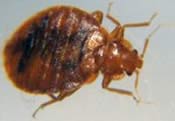Bed bugs are currently considered to be a nuisance pest. Our government officials state that despite the fact that bed bugs do bite humans and suck blood, that they do not transmit pathogens from person to person. An entomologist from Cornell University, who specializes in the study of bed bugs, is convinced that there is a connection between patients that are in hospitals who are bitten by bed bugs and then come down with Staphylococcus or MRSA. Her findings have revealed that those hospitals which have ongoing bed bug infestations are not able to rid themselves of antibiotic resistant MRSA, which is causing dangerous and sometimes deadly results for patients.
Bed bugs are not transmitting Staphylococcus or MRSA directly to people through their bites, but the scientist believes that there is still a correlation because bed bug bites do puncture the skin. Once the skin is punctured, many people suffer an allergic reaction to the bed bug bite wound and will then experience the painful itching that ensues afterwards. People who have Staphylococcus on their skin can easily transmit the organism into the bed bug bite wound, which could then cause a secondary infection. When MRSA is introduced into a bed bug bite wound of a person who is already sick, the bacteria can cause a serious illness or even death.
Currently there are no ongoing studies with the Centers for Disease Control in regards to bed bugs bites and MRSA/Staph infections. Perhaps it’s time for research to commence and maybe then better insecticides would be released by the Environmental Protection Agency to combat New Jersey bed bug infestations, and bed bugs across the United States, once and for all!
If you are battling bed bugs in New Jersey, contact Allison Pest Control for expert bed bug eradication service!

Comments
2 responses to “Are Bed Bugs, Staphylococcus And MRSA Linked? Part II Of II”
MRSA is really dangerous because it can evolve or mutate into an even more dangerous strain of super bacteria.”””:”
Warmest wishes http://www.healthmedicinelab.com/natural-antibiotics/
Hey there, You’ve done an excellent job. I’ll definitely digg it and personally recommend to my friends. I’m confident they’ll be benefited from this website.